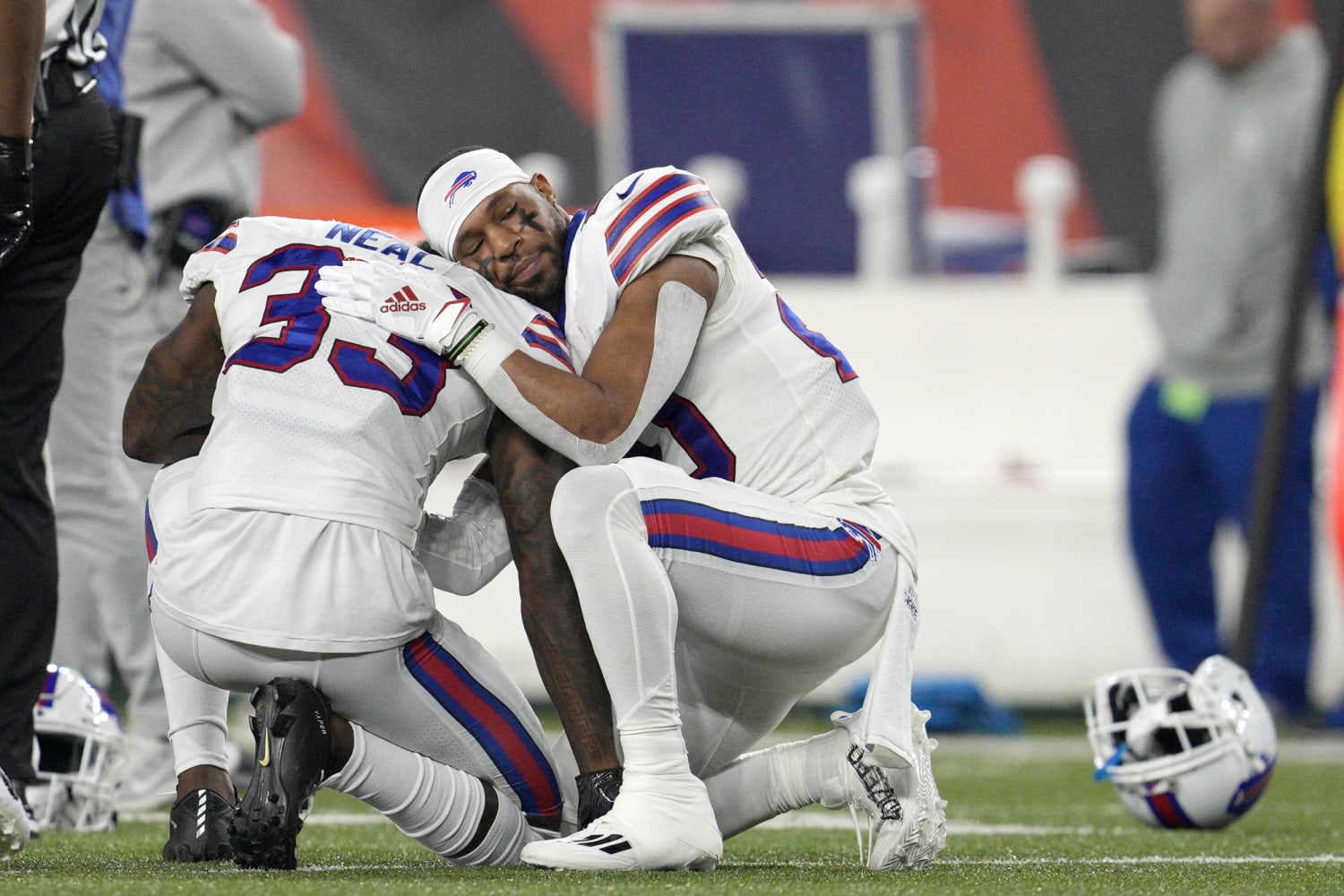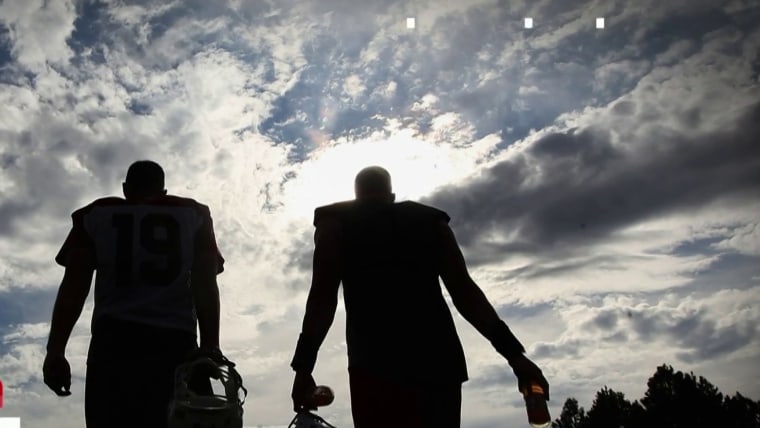Millions of football fans held their breath for close to 20 long minutes Monday night when Buffalo Bills’ Damar Hamlin had a cardiac arrest after making a routine tackle. While the players formed a prayer circle to shield him from view, the 24-year-old safety was resuscitated and taken to a hospital, where he remains in critical condition. Thousands of fans expressed their horror on social media, while more than 100 others held a solemn vigil outside the hospital.
Except for a few cretins who used the tragedy to push misinformation about Covid vaccines, there was uniform concern for the young athlete. “Often times people forget what players risk on Sundays,” tweeted Scott Quessenberry, an offensive lineman for the Houston Texas.
It’s a key point. The injury to Hamlin is not unique to football — in fact, experts told NBC News it’s likely a rare cardiac phenomenon most common in young hockey or baseball players. But the context is key here. Yet again, a player’s family and friends are left hoping for the best. Because week after week, game after game, it has become inescapably clear that the NFL is a brutal, violent league that, even in the best of circumstances, inflicts life-altering damage on its players. While Monday’s incident was likely an outlier, injuries of all kinds have become incredibly predictable. We have known this for years, even if we prefer to ignore the truth.
As this week highlighted, football’s damage takes many forms. But players’ brains get some of the worst of it. In the largest study conducted on the subject, 99% of former NFL players showed signs of chronic traumatic encephalopathy (CTE), a devastating neurodegenerative disease caused by repeated head trauma. With the caveat that all the samples came from players who were symptomatic (and who agreed for their brains to be donated to the study), the evidence clearly shows that a lifetime of routine football plays, not just the bone-breaking, tendon-tearing injuries, can cause memory loss, alarming mood swings and severe depression. In some cases, it can be a precursor to suicide, as it did for Hall of Famer Junior Seau, who killed himself in 2012 and requested that his brain be posthumously probed for signs of CTE.
It’s arguably easier to miss the damage accrued when two linemen bump into each other 75 times a game for 18 weeks.
Another key study showed that 40% of retired NFL players have traumatic brain injury, with no correlation between the number of concussions and the severity of the injury. The longer they played, the more likely they were to have brain damage.
It’s arguably easier to miss the damage accrued when two linemen bump into each other 75 times a game for 18 weeks, but this season has underscored how inherent grievous bodily harm is to the game itself. Seau’s death brought the issue of traumatic brain injury to a boiling point, and yet the league’s steps to address the issue appear to be little more than Band-Aids.
In the preseason, the NFL finally tested new helmets designed to prevent concussions. Reports from the league suggest they were effective, but no move has been made to require them in the regular or postseason.
The league does have a concussion protocol to determine whether a player who has been hit hard can return to the game, but it’s an internal process subject to unspoken pressures. On Sept. 25, Miami Dolphins quarterback Tua Tagovailoa sustained such a brutal hit that he was helped off the field by trainers. He later returned to the game, and the team labeled it a back injury.
Less than a week later, Tagovailoa and the Dolphins were back on the field, where he had his head slammed once again against the grass by an opposing player. He raised his hands in an unnatural movement that can be a sign of traumatic brain injury. Former players expressed outrage that he was even playing, while after the game, his coach expressed relief “that he didn’t have anything more serious than a concussion.”
Just Sunday, Philadelphia Eagles defensive end Josh Sweat stayed motionless facedown on the field for several minutes after smashing into a New Orleans Saints player. He left the game with a neck injury, but is expected to recover. Also on Sunday, Indianapolis Colts quarterback Nick Foles convulsed on the field after being sacked by Giants linebacker Kayvon Thibodeaux. After the game, the team announced Foles suffered only a “rib injury,” but the image of Thibodeaux miming snow angels next to a convulsing Foles is yet another bad look for him and for the NFL.
The risk every player takes on Sundays.
I didn’t see any of these injuries in real time. I gave up on the sport nine years ago, when I realized I could no longer square my love of football with the brutal blood sport it had become. I got my Sundays back and leaned harder into other passions. In almost a decade, I haven’t watched a single play, and at no point have I regretted the decision.
The question is: Why haven’t more fans done the same? The league is always enmeshed in controversy, from Colin Kaepernick’s protest and the subsequent backlash to the league’s lenient response to sexual assault allegations against Deshaun Watson to its cruel animal research on man’s best friend. None of it makes a dent in the league’s popularity.
Last year, viewership jumped 10% and reached its highest level in six years.
We may pray and hope for Hamlin’s recovery, but we’ll be back in the stands Sunday afternoon. Indeed, some people are already noting Hamlin’s injury was more bad luck than brutality. That’s technically true. But it’s also one more broken body in a season full of them. On a philosophical level, incidents like this one should remind fans about the broader cost of America’s game. But it’s just as likely to further desensitize viewers to the impact of next week’s round of gruesome injuries.
Source: | This article originally belongs to Nbcnews.com











